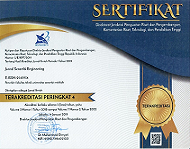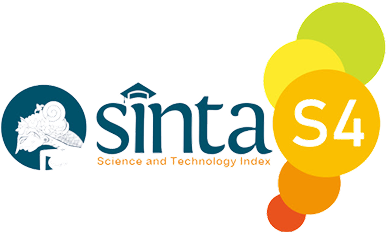Pengembangan Sistem Otomatisasi Pengisian APAR: Inovasi Menuju Efisiensi dan Efektivitas
Keywords:
APAR, Api, Pengisian UlangAbstract
One of the fire extinguishers commonly used in various places and also utilized in practical training for students in the Aircraft Accident Rescue Program (Diploma Three) is the Portable Fire Extinguisher (APAR). In their learning, students are not only taught how to use APAR but also about its working system, maintenance, and refilling process. A drawback of the current APAR refilling process is the frequent spillage of dry chemical powder (DCP) and inaccurate measurements. The aim of this research is to design an automatic APAR refilling device that can serve as a learning tool for students. The method used is VDI 2221 (Verein Deutscher Ingenieure), a systematic approach for solving problems and optimizing the use of materials and technology. The outcome of this research is the development of a comprehensive APAR refilling device that integrates the removal of old DCP, refilling with new DCP, and nitrogen charging. The test results showed that the process of suctioning DCP powder and filling nitrogen for a 6 kg cylinder takes 7 minutes and 50 seconds. This tool makes the APAR refilling process easier, minimizes DCP spillage, and saves time during the refilling process.
References
[1] R. Febriana, L. D. Fathimahhayati, and T. A. Prawitra, “Penentuan Jumlah Alat Pemadam Api Ringan (APAR) Optimal (Studi Kasus: Gedung Fakultas Teknik Universitas Mulawarman),” J. REKAVASI, vol. 10, no. 2, pp. 1–10, 2022.
[2] M. R. Suryoputro, F. A. Buana, A. D. Sari, and F. I. Rahmillah, “Active and passive fire protection system in academic building KH. Mas Mansur, Islamic University of Indonesia,” MATEC Web Conf., vol. 154, no. March, 2018, doi: 10.1051/matecconf/201815401094.
[3] L. Asiri, “Pelaksanaan Mitigasi Bencana Kebakaran Pada Dinas Pemadam Kebakaran Kabupaten Buton,” Kybernan J. Stud. Kepemerintahan, vol. 3, no. 2, pp. 28–40, 2020, doi: 10.35326/kybernan.v3i2.843.
[4] R. S. Miranti and Mardiana, “Penerapan Sistem Proteksi Aktif dan Sarana Penyelamatan Jiwa Sebagai Upaya Pencegahan Kebakaran,” Higeia J. Public Heal. Res. Dev., vol. 2, no. 1, pp. 12–22, 2018, [Online]. Available: http://journal.unnes.ac.id/sju/index.php/higeia
[5] C. Kuntoro, “Implementasi Manajemen Risiko Kebakaran Berdasarkan (IS) ISO 31000 PT APAC Inti Corpora,” Higeia J. Public Heal. Res. Dev., vol. 1, no. 4, pp. 109–119, 2017.
[6] A. Syamsuadi, D. Arisandi, S. Hartati, L. Trisnawati, L. Elvitaria, and S. Setyo Nugroho, Kebijakan Mitigasi Kebakaran Hutan Dan Lahan Berbasis Pemberdayaan Desa Wisata Digital Sadar Bencana (DWDSB) di Riau, vol. 3. 2023.
[7] R. Yunita, I. Rusman, A. J. Wahidin, M. I. Wuraisy, and N. Akbar, “Perancangan Sistem Aplikasi Berbasis Android untuk Pengecekan Alat Pemadam Api Ringan melalui E-APAR,” J. Eng. Technol. Innov., vol. 2, no. 2, pp. 72–80, 2023, [Online]. Available: https://www.ejournal-rmg.org/index.php/JETI/article/view/123%0Ahttps://www.ejournal-rmg.org/index.php/JETI/article/download/123/139
[8] T. H. Susilo, “Studi Produk Peralatan Penunjang Petugas Pemadam Kebakaran (Studi Kasus: Alat Pemadam Api Ringan),” Narada J. Desain dan Seni, vol. 7, no. 2, p. 259, 2020, doi: 10.22441/narada.2020.v7.i2.009.
[9] H. Panja, “Penerapan Sarana Alat Pemadam Api Ringan di Pusat Perbelanjaan Mall,” Higea J. Public Heal. Res. Dev., vol. 4, no. 2, pp. 280–290, 2020.
[10] F. F. Hillah, R. Firdaus, F. W. Kurnia, J. M. Zea, and M. Nourma, “Penerapan Keselamatan Kerja Melalui Sosialisasi Dan Pelatihan Penggunaan Apar (Alat Pemadam Api Ringan) Di Universitas X,” SWARNA J. Pengabdi. Kpd. Masy., vol. 1, no. 4, pp. 462–467, 2022.
[11] M. L. Ashari, M. F. Maulana, B. A. Rahmadany, and A. A. Mufida, “Evaluasi Kesesuaian Alat Pemadam Api Ringan Berdasarkan Peraturan Menteri Pekerjaan Umum No. 26 Tahun 2008 dan Permenakertrans No. 04 Tahun 1980 pada Industri Pupuk,” Int. J. Eng. Econ. Soc. Polit. Gov., vol. 1, no. 3, pp. 107–114, 2023, [Online]. Available: http://ijespgjournal.org/index.php/ijespg/article/download/41/32
[12] L. Firdani, Ekawati, and B. Kurniawan, “Analisis Penerapan Alat Pemadam Api Ringan (APAR) Di PT. X Pekalongan,” Junrla Kesehat. Masy., vol. 2, no. 5, pp. 300–308, 2014.
[13] A. Musadek, A. Setiawan, and A. Budiarto, “Penyuluhan dan Pelatihan Penggunaan Alat Pemadam Api Ringan (APAR) pada Warga Rusun Siwalankerto,” J. Public Transp. Community, vol. 1, no. 2, pp. 31–39, 2021, doi: 10.46491/jptc.v1i2.590.
[14] Y. Widjaya and N. A. Mahbubah, “Evaluasi Inspeksi Alat Pemadam Api Ringan Menggunakan Pendekatan Job Safety Analysis,” J. Serambi Eng., vol. 7, no. 3, pp. 3314–3320, 2022, doi: 10.32672/jse.v7i3.4198.
[15] R. Sofian, F. Ramdani, F. R. Ferdiansyah, and R. W. Nugraha, “Perangkat Lunak Inspeksi Alat Pemadam Api Ringan Berbasis Website,” J. Nuansa Inform., vol. 17, no. 1, pp. 75–86, 2023, [Online]. Available: https://journal.uniku.ac.id/index.php/ilkom
[16] M. Fatah, F. M. Suud, and M. T. Chaer, “Jenis-Jenis Kesulitan Belajar Dan Faktor Penyebabnya Sebuah Kajian Komperehensif Pada Siswa Smk Muhammadiyah Tegal,” Psycho Idea, vol. 19, no. 1, p. 89, 2021, doi: 10.30595/psychoidea.v19i1.6026.
[17] S. Bahiroh, S. A. Pratiwi, and F. M Suud, “Improving Student Happiness Through The Snowball Throwing Method In The Implementation Of Student Conceling Groups Of State Vocational Schools 2 Depok Yogyakarta,” J. Crit. Rev., 2020.
[18] K.-H. Pahl, G., Feldhusen, W. B. J., & Grote, Engineering Design A Systematic Approach / by Gerhard Pahl, W. Beitz, Jörg Feldhusen, KarlHeinrich Grote. 2007.
Downloads
Published
Issue
Section
License
Copyright (c) 2024 Surya Tri Saputra, Bhima Shakti Arrafat, Supri (Author)

This work is licensed under a Creative Commons Attribution 4.0 International License.












